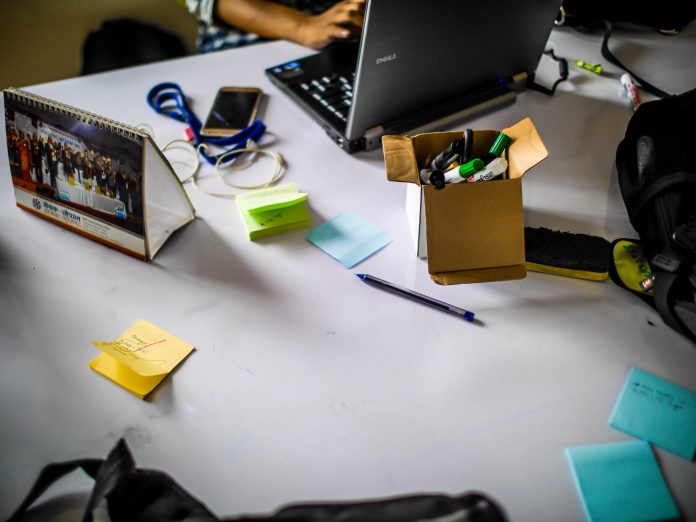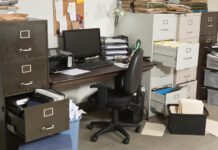I am a father of two young girls, and thus keeping clutter-free is hard. It’s so easy to accumulate stuff from toys, puzzles, books, strollers, scooters, and so on. My wife and I celebrate every time we can get rid of something we no longer need. There was a big high-five when we could sell the high chair. We recently gave away the double stroller, and the next big item on the list is the changing table. I think a cork will be popped when that one is gone. It takes discipline and focus to keep your world clutter-free, but the mental freedom it delivers is well worth it.
A good place to start is the desk in your office. Many of us with messy desks believe that it is “organized chaos” and that we know where everything is. The reality is that having to keep tabs of all the documents – notes, to-dos, contracts, and so on is mentally taxing. Installing a system to manage your desk and keep it clear gives you an important shot of focus and releases energy that can be used to do something productive.
Carve out an hour or two and review all the pieces of paper on your desk. Ask yourself of every piece of paper: “What do I need to know or do with this paper?” “When was the last time I used this content?” You may think that you’ll need some of the content at some point in the future, but I would encourage you to be bold and discard anything that is not really worth retaining. With all the documentation create three discrete piles:
Pile 1: To be thrown out
Pile 2: To be actioned and then thrown out
Pile 3: To be filed for future reference
Once all paper is accounted for, retain the things that stimulate you, calm you, and motivate you. Pictures of your family or images of a beautiful natural landscape are good options as they are soothing, inspiring, and a source for happiness. You could have some self-affirmations or motivational quotes from someone you respect. All of this serves to fuel your productivity and focus.
Once your desk is clutter-free, you may have a few documents that need to be filed. Physical filing can take a little time. I was one of those people that used to put things off that weren’t a priority, like tidying up a filing cabinet. I also retained documentation I thought may be of use in the future. When I eventually carved out a morning to reorganize and declutter my filing cabinet, it was a big day. Once you get into it and start throwing things away, it immediately starts to feel good. You easily find yourself in declutter mode and the momentum will build. Really question whether you will actually get use out of each document in the future. Based on experience, 85% of documentation you retain you won’t use again. So, the 15% of the information you actually need is being lost in all the other 85%. Be ruthless. We keep far too many documents. I would hate to see on average over a year how much time is wasted looking for documents we need. I’m sure it would be weeks. Needless to say, simplifying file structures and culling unneeded material will have a big impact on your productivity.
Take time to also consolidate and streamline your folder titles. Try to create mutually exclusive folders; any folders that could be combined should be. I integrated professional articles I wanted to keep with other business forms that I couldn’t throw away, like business identification forms. I used to have a file full of physical articles or PowerPoint decks I added to over the years. I also kept all official documentation I received for Simplify Work, like insurance information and bank notifications. I realized that the vast majority of this content did not need to be retained, and I was able to merge two folders into one, given the significantly reduced size of them.
There may be a few pieces of information in certain documents that is worth keeping a record of, in which case you can pull those bits of information and capture them in an electronic file. Which brings us to computer files. These certainly should not escape our decluttering rampage.
Use the afternoon to review your computer files and delete duplications and low-value files of every sort. Consolidate folders as much as possible and again, remove any that you don’t need. The goal is getting to a streamlined folder structure with contents that you actually use. If there are files that you truly believe are worth retaining but will not likely use on an ongoing basis, move them from your hard drive to a dedicated folder on an external hard drive or in the cloud. Free up and simplify your hard drive. When I reviewed my old folder structure, I had 10 folders with numerous subfolders. Within each subfolder were tons of documentation I had incrementally added over the years. It took some time but after the decluttering process I now have six folders with streamlined subfolders, now holding far fewer documents. I now can find information I need much easier, saving me time and energy every day.
Don’t forget about the cloud, either. It has become the new dumping ground for all our “might use at some point” material. Due to the massive capacity of our cloud accounts, we are tempted to dump anything of interest there. The problem is that our cloud accounts are becoming totally cluttered with various photos, music, and random documentation. Follow the same system as you did with your filing cabinet and hard drive; remove anything that isn’t really of use and streamline your folder structure.
All of a sudden, at the end of the day you will find that you have a clear desk, a thinned out filing cabinet, and an organized and streamlined folder structure on both your hard drive and cloud account. There will also be a big pile of trash on the floor to discard. And it will feel great! It will feel like a weight has been lifted. Your newfound conversion to the declutter tribe will likely motivate you to look at other parts of your house or life. You may want to review your book collection. I found I didn’t use or need about 70% of my books, so decided to donate all the excess to a local used book store. I also went into my closet and looked at all of my clothes and shoes. There were so many shirts, T-shirts, and pants that I never wear or may wear once a year. I got a big garbage bag and with my decluttering zeal set about filling the bag with any item of clothing that I didn’t really need. Like my excess books, it felt good to be able to donate my excess clothing to the Salvation Army. Now when I visit a clothing store and I see something that may look good, I really question whether I actually need it. It is a mindset shift that enables me to retain by decluttered status and saves money in the process.
While it may seem challenging to find the time to declutter your home and office, it is certainly worth the investment. It is a valuable step toward taking control of your life and gaining the individual clarity that seems to be out of reach for most in today’s high-paced, scattered world.
Find a Home-Based Business to Start-Up >>> Hundreds of Business Listings.

















































